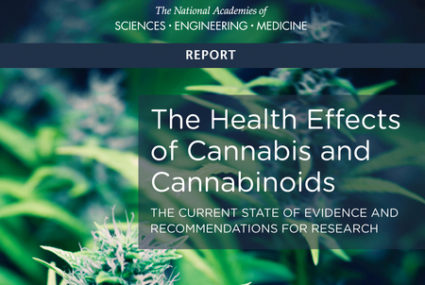The National Academy of Sciences, Engineering, and Medicine released a comprehensive report acknowledging that “conclusive or substantial evidence” exists for the efficacy of cannabis and its derivatives in patients suffering from chronic pain, multiple sclerosis, and other disorders.
In one of the most comprehensive studies of recent research on the health effects of recreational and therapeutic cannabis use, the new report offers a rigorous review of relevant scientific research published since 1999. Researchers reviewed over 10,000 scientific abstracts when compiling the findings.
The report summarizes the current state of evidence regarding what is known about the health impacts of cannabis and cannabis-derived products, including effects related to therapeutic uses of cannabis and potential health risks related to certain cancers, diseases, mental health disorders, and injuries.
Presently, the US Controlled Substances Act defines marijuana as a Schedule I prohibited substance with “no currently accepted medical use in treatment in the United States.” Last August, the US Drug Enforcement Administration rejected petitions that sought to reclassify marijuana, claiming, “There are no adequate or well-controlled studies that determine marijuana’s efficacy.”
The National Academy of Sciences’ conclusions are clearly inconsistent with the DEA’s position.
There are nearly 100 National Academy of Sciences’ report conclusions related to the health effects of cannabis and cannabinoid use. The report finds that:
There is conclusive or substantial evidence that cannabis or cannabinoids are effective:
- For the treatment for chronic pain in adults (cannabis)
- Antiemetics in the treatment of chemotherapy-induced nausea and vomiting (oral cannabinoids)
- For improving patient-reported multiple sclerosis spasticity symptoms (oral cannabinoids)
There is moderate evidence that cannabis or cannabinoids are effective for:
- Improving short-term sleep outcomes in individuals with sleep disturbance associated with obstructive sleep apnea syndrome, fibromyalgia, chronic pain, and multiple sclerosis (cannabinoids, primarily nabiximols).
There is limited evidence that cannabis or cannabinoids are effective for:
- Increasing appetite and decreasing weight loss associated with HIV/AIDS (cannabis and oral cannabinoids)
- Improving clinician-measured multiple sclerosis spasticity symptoms (oral cannabinoids)
- Improving symptoms of Tourette syndrome (THC capsules)
- Improving anxiety symptoms, as assessed by a public speaking test, in individuals with social anxiety disorders (cannabidiol)
- Improving symptoms of posttraumatic stress disorder (nabilone; one single, small fair-quality trial)
There is limited evidence of a statistical association between cannabinoids and:
- Better outcomes (i.e., mortality, disability) after a traumatic brain injury or intracranial hemorrhage
There is limited evidence that cannabis or cannabinoids are ineffective for:
- Improving symptoms associated with dementia (cannabinoids)
- Improving intraocular pressure associated with glaucoma (cannabinoids)
- Reducing depressive symptoms in individuals with chronic pain or multiple sclerosis (nabiximols, dronabinol, and nabilone)
The report also puts forth recommendations to help advance the cannabis research field and better inform public health decisions.
Read the full report – Health Effects of Cannabis and Cannabinoids.

